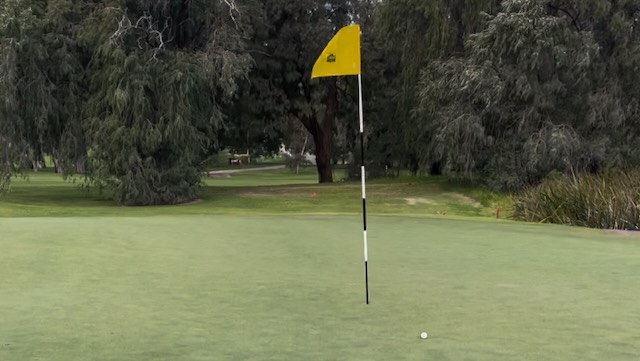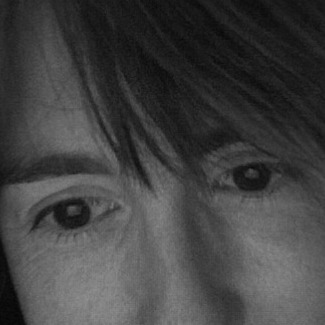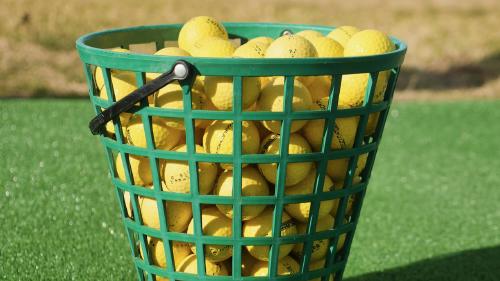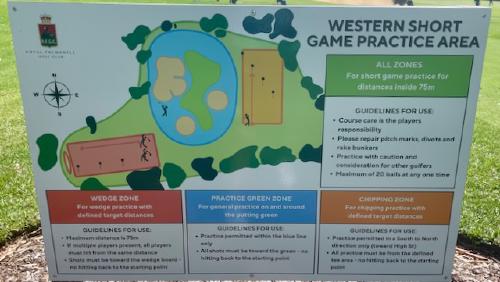I’ve had a few conversations in the last week or so, most recently with my golf coach, which have made me think about goals…
…in relation to golf and life more generally.
The goal in a game of golf might seem pretty clear - get the ball in the hole in as few shots as possible (see above image of a ball next to the par 4 15th hole, no doubt in my image library because I was there for two shots, ie putting for birdie, but luckily I can’t remember if I made that putt and it was certainly a practice round because I took the time to make a video as I walked up the green)!
However, as my coach and I dicussed this morning, this sort of goal, which can also be thought of in terms of competition scores or bringing in one’s handicap, while simple and sometimes useful, can also be counterproductive. I’ve had more then one conversation that has touched on the idea of goals this week, so what I’ve been thinking about today applies as much to life more generally as golf in particular.
Destinations and goals, versus journeys and processes:
A couple of quick and dirty web searches (using DuckDuckGo, not Google, because I’m avoiding AI search, although the sites I find are increasingly poorly written and repetitive, thus making my Gen AI warning alarm sound) give me the sense that a focus on journeys or processes, rather than destinations and goals, is quite often linked with religion, maybe most often Zen Buddhism (although not exclusively).
A more secular viewpoint can be articulated, purely around the way that defining a goal sets an end point, while driving home the idea that this is something you don’t have, or somewhere you haven’t reached. Once it’s attained you will need to decide on a new goal (if you want to keep moving). But what do you have and where are you now? Appreciating these things is always important.
From a personal perspective, I increasingly find myself setting aside fixed goals to focus on dynamic processes, with much more interest now on body and feel, rather than mind and thinking (or overthinking, at least). I’m finding this hard to write (although I do want to work through the ideas here), because I’m having to think too hard!
Work goals (and the difficulty with work processes):
One of the reasons I left my academic job was because I found both the goals and processes involved stressful and, often, de-motivating as opposed to motivating let alone sparking joy.
Most of my problems began with research - since I found the research writing process difficult from my time as a PhD student on. At least I was happy with the results of my writing struggles, and I’m glad to have a complete record on this site of all my publications (along with an archive of the final published versions so I can share these with anyone who is interested to read). The recent (ie in the last few years) move away from publication measures to proving and measuring research engagament and recently was a new game I never felt equipped to play.
Teaching began as something I really enjoyed, in particular face-to-face, but this changed over the years. Covid moved things even more online than they already were, with only a partial return to face-to-face teaching. The rise of Generative AI introduced new questions around how university education worked. I’m so concerned with the environmental impacts of these technologies that I found it impossible to embrace them in any easy way (even as I was trying to help students recognise how to use such technologies in the best, ethical ways).
In terms of teaching and goals… well, feelings of accomplishment were mostly lacking. Institutional quantitative and qualitative surveys are known to be flawed. Academics all fall into the trap of reading over many positive, to focus on a few negative, evaluations. I do have some letters, cards and emails from students directly thanking me for my work. These provide the best and most valuable commentary on my time as a lecturer and supervisor.
What are my golf goals (or are they not goals)?
I might say I want to enjoy hitting satisfying shots, without worrying overly about scores and handicaps, but what does this really mean? Does this mean high scores on all aspects of a PAD analysis? I think it is probably less tangible, more to do with the feel of the shot (wherever it goes).
Maybe, it is about the game in a broader sense? While a single shot can be satisfying, it’s stringing a few together that really hits the spot. Maybe a good, or great, set of shots to complete a hole is the goal (as many times as possible in a round)?
The attempt to set aside goals, as limited and less helpful than they seem, may mean that it’s the process of playing that is the key.
It might be best to concentrate on the feeling of the process. Appreciating where you are now, how you would like the game to feel, moving towards that feeling, and in the process playing better golf?
Is this too vague? Probably.




